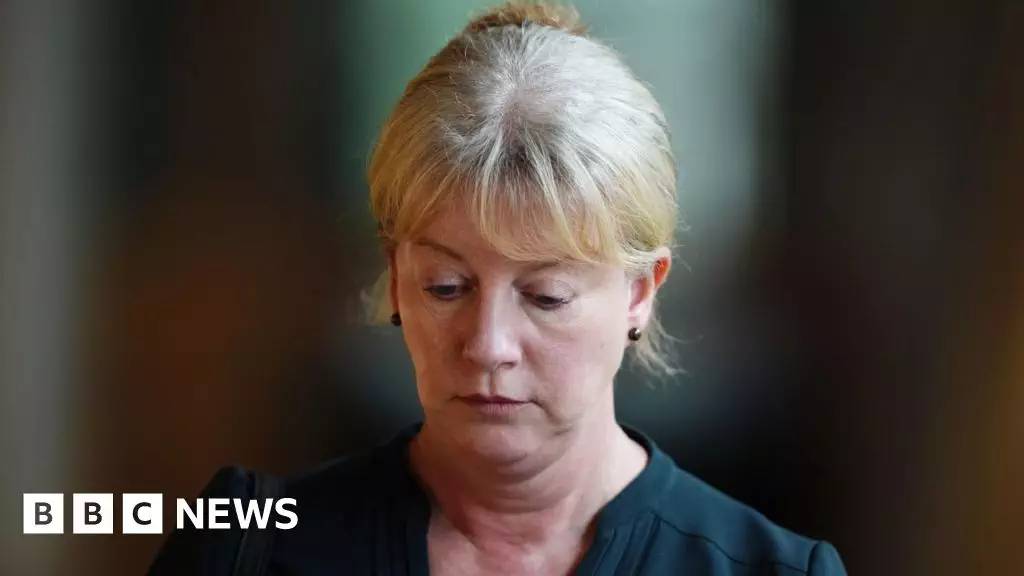As she gets ready to unveil her draft budget for the upcoming year, Scotland’s Finance Secretary, Shona Robison, is facing pressure to implement extensive reforms.
Local governments want more funding and autonomy, unions claim that a teacher shortage is endangering education, and spending watchdog Audit Scotland says that the NHS is unsustainable in its current form.

There are also demands that the SNP limit access to “freebies” like state-funded university tuition and replace the council tax with a new system.
According to Robison, the budget will prioritize “tackling the climate emergency” and ending child poverty while enhancing public services and expanding the economy.
The Scottish Parliament will examine her tax and spending package throughout the winter before a vote in February. In order for it to pass into law, she will need backing from parties other than the SNP minority government.
As a result of measures taken by Chancellor Rachel Reeves in her October Budget at Westminster, the UK government claims that Robison has an additional £3.4 billion available for this Budget, which covers 2025–2026.
This is because the Treasury provides the majority of funding for the Scottish government in the form of an annual lump sum known as the block grant, which Joel Barnett, a Labour MP, developed in the 1970s.
However, the Scottish government’s decision to raise the pay of public sector employees has already absorbed a large portion of the increase. According to Strathclyde University’s Fraser of Allander Institute, these employees are both more numerous per head and “on average, paid more in Scotland” than those in other parts of the United Kingdom.
According to the institute’s annual budget report, the settlement for 2025–2026 “is still tricky” and the finance secretary “will have limited room for manoeuvre” despite the financial increases.
Additional challenges include the effect of Labour’s decision to raise employers’ national insurance contributions and the SNP’s decision to finance a partial reversal of Reeves’ ban on winter fuel payments for pensioners.
Additionally, there are demands that Robison spend some £220 million to replicate the chancellor’s announcement of business rates—a type of property tax—relief for retail, hospitality, and leisure businesses in England.
According to Stacey Dingwall, manager of strategy and external relations for the Federation of Small Businesses Scotland, “we think it’s really incumbent on the Scottish government to pass on that 40% rates relief, given that there’s no difference in the challenges being faced either side of the border.”
Ms. Dingwall asserts that the Scottish government needs to uphold its promise to improve relations with business after a 2023 net loss of 20,000 small Scottish businesses.
“People only seek assistance.”
Scotland’s whole budget was approximately £60 billion last year. According to the UK government, the block grant for 2025–2026 will be £47.7 billion.
The devolved administration has limited borrowing authority, so Ms. Robison is required to balance the books annually.
Edinburgh-administered taxes like income tax, land and buildings transaction tax (previously known as stamp duty), and company rates provide the remaining funds for her budget.
Health, education, policing, justice, and housing are just a few of the many public services that the Scottish government has been in charge of since devolution in 1999.
The UK government still has authority over immigration, currency, foreign policy, and defense.
However, Edinburgh has gained more control over welfare and taxes from London in the 25 years since the establishment of the current Scottish Parliament.
The Fraser of Allander Institute reports that, as a result, devolved social security spending increased from £192 million in 2018-19 to £5.1 billion in 2023-2024.
The biggest departure from Westminster social policy came in 2021 with the introduction of the Scottish Kid Payment, a weekly benefit for low-income families that is currently £26.70 per kid.
“It is definitely making an impact,” says Chris Birt, associate director of the Joseph Rowntree Foundation, who wants to see more money allocated to social housing, better financing for childcare and social care, and reform of the council tax.
Birt adds, “Most people don’t care if services are provided by the UK government, Scottish government, health board, council, or anything else; they just want that support to be there.”
“We definitely need to have a much more radical discussion about how we support people, not how we worry about our institutions.”
In addition to departing from Westminster on welfare, there has been a change in taxation.
Currently, people in Scotland who make more than about £29,000 annually pay more in income tax than their English counterparts.
In a system currently more complicated than anywhere else in the UK, those who earn less than that receive a slightly lower salary.
After then-First Minister Humza Yousaf’s shocking decision to reinstate a council tax freeze last year, Ms. Robison must also think about what to do with the levy.
If anything, a prolongation of that freeze in this year’s budget would be even more shocking, putting John Swinney, Yousaf’s successor, in a sour relationship with the leaders of the local authorities.
Consequently, people view it as unlikely.
The SNP has maintained and increased the availability of numerous state-funded benefits during its 17 years in power at Holyrood, including prescription drugs, university tuition, personal care for the older people, and bus transportation for the youngest and oldest Scots.
This is a negligent use of a limited amount of money, according to some critics, such as Alison Payne, research director of the think tank Reform Scotland.
“Where budgets are tight and resources are dwindling, you need to have a conversation about whether to target support to those who need it most,” says Payne.
However, Robison’s largest source of trouble is the National Health Service. In addition to taking up 40% of her budget, it is also under a great deal of strain.
The nation’s present healthcare delivery model is unsustainable, according to Audit Scotland, the public spending watchdog, with a “worsening financial position” and “ongoing performance issues.”
Here, too, there is a desire for fundamental reform—possibly to the extent of discontinuing some services—rather than merely more funding or tweaking of current policies.
Before the budget, Scottish Labour declared that SNP mismanagement and waste had “left every institution in Scotland weaker.”
The Scottish Conservatives accused the SNP of “failing Scotland by making people pay more while getting less.”
The Scottish Liberal Democrats’ leader, Alex Cole-Hamilton, stated that the SNP would need to exert significant effort to persuade his party to approve the budget.
“A progressive budget that invests in tackling the climate crisis and lifting children out of poverty” is what the Scottish Greens stated they wanted to see.
The Alba Party told Swinney to reject any proposals from parties “that want to rip up the social contract that Alex Salmond delivered while in office”.
For Robinson and her boss, John Swinney, who has pledged to lead Scotland out of “a long, dark winter” and into the “warmth of spring,” it all presents a formidable obstacle.


